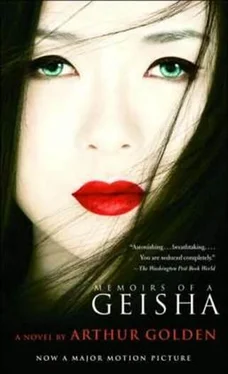During the rest of the spring and all that summer following the letter, I felt like a child lost on a lake in the fog. The days spilled one after another into a muddle. I remember only snippets of things, aside from a constant feeling of misery and fear. One cold evening after winter had come, I sat a long while in the maids’ room watching snow falling silently into the okiya’s little courtyard. I imagined my father coughing at the lonely table in his lonely house, and my mother so frail upon her futon that her body scarcely sank into the bedding. I stumbled out into the courtyard to try to flee my misery, but of course we can never flee the misery that is within us.
Then in early spring, a full year after the terrible news about my family, something happened. It was the following April, when the cherry trees were in blossom once again; it may even have been a year to the day since Mr. Tanaka’s letter. I was almost twelve by then and was beginning to look a bit womanly, even though Pumpkin still looked very much like a little girl. I’d grown nearly as tall as I would ever grow. My body would remain thin and knobby like a twig for a year or two more, but my face had already given up its childish softness and was now sharp around the chin and cheekbones, and had broadened in such a way as to give a true almond shape to my eyes. In the past, men had taken no more notice of me on the streets than if I had been a pigeon; now they were watching me when I passed them. I found it strange to be the object of attention after being ignored for so long.
In any case, very early one morning that April, I awoke from a most peculiar dream about a bearded man. His beard was so heavy that his features were a blur to me, as if someone had censored them from the film. He was standing before me saying something I can’t remember, and then all at once he slid open the paper screen over a window beside him with a loud clack . I awoke thinking I’d heard a noise in the room. The maids were sighing in their sleep. Pumpkin lay quietly with her round face sagging onto the pillow. Everything looked just as it always did, I’m sure; but my feelings were strangely different. I felt as though I were looking at a world that was somehow changed from the one I’d seen the night before-peering out, almost, through the very window that had opened in my dream.
I couldn’t possibly have explained what this meant. But I continued thinking about it while I swept the stepping-stones in the courtyard that morning, until I began to feel the sort of buzzing in my head that comes from a thought circling and circling with nowhere to go, just like a bee in a jar. Soon I put down the broom and went to sit in the dirt corridor, where the cool air from beneath the foundation of the main house drifted soothingly over my back. And then something came to mind that I hadn’t thought about since my very first week in Kyoto.
Only a day or two after being separated from my sister, I had been sent to wash some rags one afternoon, when a moth came fluttering down from the sky onto my arm. I flicked it off, expecting that it would fly away, but instead it sailed like a pebble across the courtyard and lay there upon the ground. I didn’t know if it had fallen from the sky already dead or if I had killed it, but its little insect death touched me. I admired the lovely pattern on its wings, and then wrapped it in one of the rags I was washing and hid it away beneath the foundation of the house.
I hadn’t thought about this moth since then; but the moment it came to mind I got on my knees and looked under the house until I found it. So many things in my life had changed, even the way I looked; but when I unwrapped the moth from its funeral shroud, it was the same startlingly lovely creature as on the day I had entombed it. It seemed to be wearing a robe in subdued grays and browns, like Mother wore when she went to her mah-jongg games at night. Everything about it seemed beautiful and perfect, and so utterly unchanged. If only one thing in my life had been the same as during that first week in Kyoto… As I thought of this my mind began to swirl like a hurricane. It struck me that we-that moth and I-were two opposite extremes. My existence was as unstable as a stream, changing in every way; but the moth was like a piece of stone, changing not at all. While thinking this thought, I reached out a finger to feel the moth’s velvety surface; but when I brushed it with my fingertip, it turned all at once into a pile of ash without even a sound, without even a moment in which I could see it crumbling. I was so astonished I let out a cry. The swirling in my mind stopped; I felt as if I had stepped into the eye of a storm. I let the tiny shroud and its pile of ashes flutter to the ground; and now I understood the thing that had puzzled me all morning. The stale air had washed away. The past was gone. My mother and father were dead and I could do nothing to change it. But I suppose that for the past year I’d been dead in a way too. And my sister… yes, she was gone; but I wasn’t gone. I’m not sure this will make sense to you, but I felt as though I’d turned around to look in a different direction, so that I no longer faced backward toward the past, but forward toward the future. And now the question confronting me was this: What would that future be?
The moment this question formed in my mind, I knew with as much certainty as I’d ever known anything that sometime during that day I would receive a sign. This was why the bearded man had opened the window in my dream. He was saying to me, “Watch for the thing that will show itself to you. Because that thing, when you find it, will be your future.”
I had no time for another thought before Auntie called out to me:
“Chiyo, come here!”
* * *
Well, I walked up that dirt corridor as though I were in a trance. It wouldn’t have surprised me if Auntie had said, “You want to know about your future? All right, listen closely…” But instead she just held out two hair ornaments on a square of white silk.
“Take these,” she said to me. “Heaven knows what Hatsumomo was up to last night; she came back to the okiya wearing another girl’s ornaments. She must have drunk more than her usual amount of sake. Go find her at the school, ask whose they are, and return them.”
When I took the ornaments, Auntie gave me a piece of paper with a number of other errands written on it as well and told me to come back to the okiya as soon as I had done them all.
Wearing someone else’s hair ornaments home at night may not sound so peculiar, but really it’s about the same as coming home in someone else’s underwear. Geisha don’t wash their hair every day, you see, because of their fancy hairstyles. So a hair ornament is a very intimate article. Auntie didn’t even want to touch the things, which is why she was holding them on a square of silk. She wrapped them up to give them to me, so that they looked just like the bundled-up moth I’d been holding only a few minutes earlier. Of course, a sign doesn’t mean anything unless you know how to interpret it. I stood there staring at the silk bundle in Auntie’s hand until she said, “Take it, for heaven’s sake!” Later, on my way to the school, I unfolded it to have another look at the ornaments. One was a black lacquer comb shaped like the setting sun, with a design of flowers in gold around the outside; the other was a stick of blond wood with two pearls at the end holding in place a tiny amber sphere.
I waited outside the school building until I heard the don of the bell signaling the end of classes. Soon girls in their blue and white robes came pouring out. Hatsumomo spotted me even before I spotted her, and came toward me with another geisha. You may wonder why she was at the school at all, since she was already an accomplished dancer and certainly knew everything she needed to know about being a geisha. But even the most renowned geisha continued to take advanced lessons in dance throughout their careers, some of them even into their fifties and sixties.
Читать дальше












